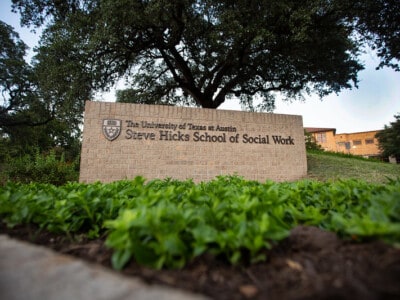In early February, Weiwen Zeng received a call from a colleague in Hong Kong. Now a doctoral student at the Steve Hicks School of Social Work, Zeng was a clinical social worker in Hong Kong before coming to the Forty Acres.
February was the height of the COVID-19 pandemic in Wuhan. Through an online network, Zeng’s colleague had been providing remote clinical supervision to social workers and mental health professionals working on the ground in Wuhan with families and individuals affected by the virus. She said that the network (Novel Coronavirus Pneumonia Relief Network) needed more supervisors and asked Zeng to join.
“I was assigned a team of about ten social workers, and did online group supervision with them over WeChat. I also did live supervision, where I joined a counseling session and guided the counselor on how to better help the client,” Zeng explained.
Through this experience, Zeng realized that social workers in Wuhan needed more training in crisis counseling. This type of counseling uses specific strategies to help clients reduce acute distress, restore physical and mental stability and integrate coping skills during and after a major crisis.
“Social workers and other mental health professionals in the network felt they didn’t have enough experience working in a crisis situation,” Zeng said. “They were suffering from burnout, and felt that they could not respond effectively to the influx of individuals and families affected by the virus.”
Zeng reached out to professor Cynthia Franklin, who is an internationally recognized expert in Solution-Focused Brief Therapy or SFBT. This research-based approach uses a series of precisely constructed questions to help clients find solutions in the present time.
“When Weiwen contacted me I immediately thought about the urgency of the need to put something together,” Franklin said. “I could feel the compassion of Weiwen and my heart really went out to the social workers and the desperate needs.”
Having spent time in China conducting SFBT workshops, Franklin knew that the approach could be helpful. She referred Zeng to clinical professor Jack Nowicki, who had developed a training workshop on crisis intervention from an SFBT approach and delivered it for youth service agencies all across Texas.
Under Franklin and Nowicki’s guidance, Zeng together with doctoral students Qi Chen, Xiao Ding and Chun Liu updated and shortened the training, which was originally six hours long. The students also translated all workshop materials to Chinese, and suggested how to modify some of the language so it would better resonate with Chinese culture.
For example, Zeng said, this approach uses a “miracle question,” which asks clients to imagine what their life would be like if they woke up one morning and, by miracle, all the current barriers and problems they were facing were gone.
“In the Chinese context people may not understand the idea of miracle, which comes from a Christian religious background,” Zeng said. “So we tweaked the question to ask people to imagine what would happen if they suddenly had good fortune, which is a more Chinese concept.”
On March 11, Franklin and Nowicki conducted the training remotely for more than 200 social workers in China. Zeng and his classmates assisted and translated questions from the audience into English and the responses of the presenters back into Chinese.
“We had so many follow-ups and questions that we had to take them off-line,” Franklin said. “It was a heart wrenching experience. Most of the social workers are volunteers, and sadly some of them were infected by the virus.”
Zeng said that by now most people in Wuhan are recovered and the work has slowed down for the members of the Novel Coronavirus Pneumonia Relief Network.
“We are not as busy as back in February,” Zeng said. “We are focusing on wrapping up, and writing guidelines and recommendations on how to deal with the COVID-19 crisis that we hope are helpful for first responders in other countries.”
In the meantime, a video-recorded English version of the training is available online through the Steve Hicks School’s Office of Professional Development. The training video has been distributed to social workers across the country through the Council on Social Work Education and the National Association of Social Workers-Texas Chapter.
For example, Zeng said, this approach uses a “miracle question,” which asks clients to imagine what their life would be like if they woke up one morning and, by miracle, all the current barriers and problems they were facing were gone.
“In the Chinese context people may not understand the idea of miracle, which comes from a Christian religious background,” Zeng said. “So we tweaked the question to ask people to imagine what would happen if they suddenly had good fortune, which is a more Chinese concept.”
On March 11, Franklin and Nowicki conducted the training remotely for more than 200 social workers in China. Zeng and his classmates assisted and translated questions from the audience into English and the responses of the presenters back into Chinese.
“We had so many follow-ups and questions that we had to take them off-line,” Franklin said. “It was a heart wrenching experience. Most of the social workers are volunteers, and sadly some of them were infected by the virus.”
Zeng said that by now most people in Wuhan are recovered and the work has slowed down for the members of the Novel Coronavirus Pneumonia Relief Network.
“We are not as busy as back in February,” Zeng said. “We are focusing on wrapping up, and writing guidelines and recommendations on how to deal with the COVID-19 crisis that we hope are helpful for first responders in other countries.”
In the meantime, a video-recorded English version of the training is available online through the Steve Hicks School’s Office of Professional Development. The training video has been distributed to social workers across the country through the Council on Social Work Education and the National Association of Social Workers-Texas Chapter.
Access a video recording of the training and download training materials.


